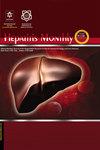Effects of Entecavir on Serum Hepatitis B Virus-DNA, Interferon-γ, and Pregenomic RNA in Patients with Chronic Hepatitis B Virus Infection
IF 0.6
4区 医学
Q4 GASTROENTEROLOGY & HEPATOLOGY
引用次数: 0
Abstract
Background: Entecavir (ETV) has been widely used in the clinical treatment of the Hepatitis B Virus (HBV). However, whether ETV is helpful in the recovery of T cell immune function remains unclear. Objectives: We aimed to assess the effects of ETV on serum HBV-DNA, interferon-γ (IFN-γ), and pregenomic RNA (pgRNA) in patients with infection. Methods: The clinical data of 300 HBV patients admitted from January 2017 to January 2019 were retrospectively analyzed, of whom 193 cases administered with ETV were assigned to an observation group, and the remaining 107 untreated cases (who refused treatment) were assigned to a blank control group. Their liver function [aspartate aminotransferase (AST) and alanine aminotransferase (ALT)], serum HBV markers [hepatitis B surface antigen (HBsAg) and hepatitis B e antigen (HBeAg)], IFN-γ, HBV-DNA, HBV pgRNA, negative conversion rates of HBeAg and HBV-DNA, and adverse reactions were compared. Results: The levels of HBsAg, IFN-γ, HBV-DNA, and HBV pgRNA were lower in the observation group than in the blank control group 12, 24, and 48 weeks after treatment (P < 0.05). The HBeAg and HBV-DNA negative conversion rates of the observation group were higher than those of the blank control group 12, 24, and 48 weeks after treatment (P < 0.05). Conclusions: Antiviral therapy with ETV can inhibit the replication of HBV-DNA, increase the HBV-DNA negative conversion rate, enhance immune function, and reduce the expression of HBV pgRNA in HBV patients.恩替卡韦对慢性乙型肝炎病毒感染患者血清乙型肝炎病毒DNA、干扰素-γ和前基因组RNA的影响
背景:恩替卡韦(ETV)已广泛应用于乙型肝炎病毒(HBV)的临床治疗。然而,ETV是否有助于T细胞免疫功能的恢复尚不清楚。目的:我们旨在评估ETV对感染患者血清HBV-DNA、干扰素-γ(IFN-γ)和前基因组RNA(pgRNA)的影响。方法:回顾性分析2017年1月至2019年1月收治的300例HBV患者的临床数据,其中193例接受ETV治疗的患者被分为观察组,其余107例未经治疗的患者(拒绝治疗)被分为空白对照组。比较其肝功能[天冬氨酸转氨酶(AST)和丙氨酸转氨酶(ALT)]、血清HBV标志物[乙型肝炎表面抗原(HBsAg)和乙型肝炎e抗原(HBeAg)]、IFN-γ、HBV-DNA、HBV-pgRNA、HBeAg和HBV-DNA阴转率及不良反应。结果:治疗后12、24、48周观察组HBsAg、IFN-γ、HBV-DNA、HBV pgRNA水平均低于空白对照组(P<0.05),结论:ETV抗病毒治疗可抑制HBV患者HBV-DNA的复制,提高HBV-DNA阴性转化率,增强免疫功能,降低HBV pgRNA的表达。
本文章由计算机程序翻译,如有差异,请以英文原文为准。
求助全文
约1分钟内获得全文
求助全文
来源期刊

Hepatitis Monthly
医学-胃肠肝病学
CiteScore
1.50
自引率
0.00%
发文量
31
审稿时长
3 months
期刊介绍:
Hepatitis Monthly is a clinical journal which is informative to all practitioners like gastroenterologists, hepatologists and infectious disease specialists and internists. This authoritative clinical journal was founded by Professor Seyed-Moayed Alavian in 2002. The Journal context is devoted to the particular compilation of the latest worldwide and interdisciplinary approach and findings including original manuscripts, meta-analyses and reviews, health economic papers, debates and consensus statements of the clinical relevance of hepatological field especially liver diseases. In addition, consensus evidential reports not only highlight the new observations, original research, and results accompanied by innovative treatments and all the other relevant topics but also include highlighting disease mechanisms or important clinical observations and letters on articles published in the journal.
 求助内容:
求助内容: 应助结果提醒方式:
应助结果提醒方式:


